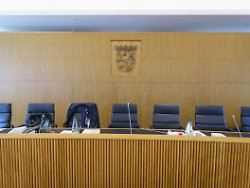Wednesday October 27, 2021
Loan Fund Unconstitutional
Court overturns Hesse’s Corona special fund
The black-green government in Hesse wants to alleviate the consequences of the corona crisis with a loan-financed special program. The opposition sees the twelve billion euro special fund as a shadow budget. The State Court agrees with the critics.
A special fund set up in Hesse to cushion the financial consequences of the corona pandemic is unconstitutional according to a judgment. It is not in accordance with the state constitution, as the Hessian State Court in Wiesbaden decided. The judges thus largely agreed with the opposition factions of the SPD and FDP as well as the AfD with their norm control requests against the black-green government coalition. The verdict is considered a severe blow to the state government.
According to the court, the special fund violates the principles of budget constitutional law and the state parliament’s budget law. In addition, the authorization to borrow contradicts the debt brake. The state parliament had no substantial opportunity to influence the concrete use of the funds. In addition, the state government could not adequately explain in the legislative process why other budgetary options, such as the complete dissolution of reserves, were not used. As a consequence of the ruling, the fund must be reorganized by March 31, 2022. Until then it will remain in force.
The state government wanted to cushion the economic consequences of the corona pandemic with the special fund called “Secure Hesse’s good future”. It contained a total of up to twelve billion euros. This was intended to support municipalities, among other things, in compensating for lower business taxes. 430 million euros were made available for the procurement of protective equipment, and a further 270 million euros for the operation of vaccination centers.
Norm control application from the SPD, FDP and AfD
Last November, the SPD and FDP submitted a norm review application against the law. The AfD turned against it separately in March. All three groups criticized the fact that the parliament had been bypassed. The black-green coalition wanted to suspend the debt brake for the special fund in summer 2020. However, that failed due to a missing two-thirds majority.
Instead, the state government enforced the special fund by means of a different procedure with a simple majority. To this end, an article in the Hessian constitution was changed, which stipulates a two-thirds majority in the debt brake implementation law for exceptions to the ban on new borrowing. Before it was passed in parliament in Wiesbaden, there had been very tough debates for weeks. The opposition vehemently rejects the special fund and has been speaking of a shadow budget ever since. Instead, there is still a demand to rely on supplementary budgets to cope with the corona costs.
Finance Minister Michael Boddenberg from the CDU last spoke of a return to economic stability in Hesse when presenting the draft budget for the coming year. As a result, the expenses from the Corona special fund were significantly lower for the next two years. Instead of the possible twelve billion euros, the country will therefore possibly only need just under nine billion euros. So far, according to the Ministry of Finance, 296 concrete aid for more than 5.9 billion euros has been initiated from the loan-financed special fund. Hessen is already starting to repay the funds in the current year.
